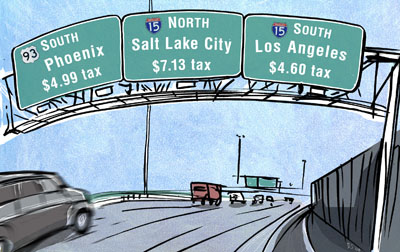Cutting gasoline use won’t cut taxes

Fuel taxes are going the way of the stegosaurus, dodo bird and Jean Claude Van Damme’s film career.
I don’t mean to get your hopes up. John McCain’s plan to cut federal fuel taxes isn’t going to pass in Congress any time soon.
I’m talking about what our commuting world will look like a decade or two from now.
Taxes never fade away; they just change names. And so it will be with the fuel tax.
Instead of taxing the fuel we use, we will be taxed for the miles we drive.
The reason is simple: Eventually fossil fuel-run vehicles will be extinct, experts predict.
With the rising cost of gasoline — the mean price for regular is still above $4.15 in the valley — people are buying fuel-efficient vehicles, driving less, and driving more efficiently.
As a result, there has already been a drop in the number of vehicles on our roads, according to the Nevada Department of Transportation. Officials have already seen a drop in the revenue gained from state and federal fuel taxes.
And the Transportation Research Board, a division of the National Research Council, recently predicted that the fuel tax will no longer be able to finance transportation needs in 2025.
Oregon transportation officials were the first to study the concept of a “road user fee.”
Released in 2007, the study used GPS receivers in vehicles to transmit via a radio frequency to receivers at gasoline stations. Every time drivers filled their gasoline tank, the GPS system would transmit miles traveled. The tax was then tacked on to their fuel purchase. A flat fee would have to be established for any system tampered with.
The study also examined the option of charging congestion fees, or fees for vehicles driving in areas during high congestion periods — think Las Vegas Boulevard and Flamingo Road at 4 p.m. on a Friday.
Although Oregon transportation officials reported that the mileage fee concept is feasible with minimal cost and minimal invasion of a driver’s privacy, I think this kind of Big Brother concept may be a bit of a hard sell.
So what would a mileage-based tax mean for valley folks?
Based on our current fuel tax rate of 50.9 cents per gallon, I calculated that a one-way road trip to Phoenix at 30 miles per gallon would cost $4.99 in taxes. Reno and Salt Lake City trips would cost $7.60 and $7.13 respectively. And a trip to Los Angeles would be $4.60.
A motorist who commutes 14 miles per day going to and from work would pay $4.96 a month in mileage taxes.
A mileage-based tax would equalize taxes for drivers no matter how fuel-efficient, or inefficient, their cars are. People who drive more fuel-efficient vehicles have had incentive to do so when it comes to paying fuel taxes.
Compare a 2008 Honda Civic, which gets 36 mpg on the highway and holds 13.2 gallons of gasoline, to a Dodge Ram pickup, which gets 18 mpg on the highway and has a 26-gallon tank.
The Civic driver pays $6.72 in taxes while filling up the vehicle. A Ram driver pays $13.23 in taxes per fill up.
Each tank would take its respective driver about 470 miles. But under a mileage-based system, their taxes would be about the same. Of course the Civic driver would still be paying far less for gasoline in the long run. (Should I also mention that the Manufacturer’s Suggested Retail Price, or MSRP, of the Civic is about $7,300 less than the pickup?).
The same principle would go for vehicles using alternative types of fuel.
There would be no need to worry about biodiesel or ethanol fueled vehicles not being taxed as much. They too would be judged by the miles they drive.
Of course, it will all be moot when transporter beams are created.
Don’t worry, I’m sure there will be a “Beam me up, Scotty” tax.
If you have a question, tip or tirade, call the Road Warrior at 387-2904, or e-mail him at roadwarrior@reviewjournal.com or fmccabe@reviewjournal.com. Please include your phone number.